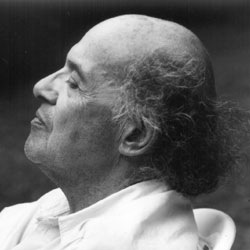I had to see La Bohème again just to
make sure for there was a little part of
me that kept the regret though when I tried
the argument again I used both hands
in order to explain and I was especially
sensitive to the landlord for I lived
both inside and outside even when I was angry
I paid my debts for I have listened to
and lived with grasshoppers and they bore me, but
Mimi, Mimi, when your hand dropped every
woman in my row was weeping and I
gave in too instead of gripping the armrest
or rubbing the back of my head; I loved it the most that
you lived inside and outside too, the snowdrop
was what you thought of, wasn’t it? You were
the one who came back, three times, it was your stubbornness,
your loyalty. One time I stood in the street
and watched a moon so thin the clouds went through it
as if there were no body, as if the cold
was so relentless nothing could live there, you with
the blackened cancle, you who stitched the lily.
Notes on the Poem
Gerald Stern is obviously fascinated with the opera La Bohème, especially the main character whose name forms the title of this poem from his 2003 Griffin Poetry Prize shortlisted collection American Sonnets: Poems. It appears that fascination even predates the poem that appears in this collection ... and we also know that his abiding interest in this classic is shared by many others. Composed in the 1890's, Giacomo Puccini's La Bohème's libretto is based on Scènes de la vie de bohème by Henri Murger. The story takes place in Paris around 1830, depicting the Bohemian lifestyle of a poor seamstress named Mimi and the closest of her artist friends. The story is told in more detail, corresponding act by act to the operatic rendition, here. Stern weaves thematic and dramatic aspects of La Bohème into "Mimi", from: "I was especially sensitive to the landlord for I lived both inside and outside" to the touching: "Mimi, Mimi, when your hand dropped every woman in my row was weeping and I gave in too" Before American Sonnets: Poems was published in 2002, Stern had a previous poem with the same title published in the June, 1994 edition of Poetry magazine, which was subsequently included in his 1995 collection Odd Mercy. It's a wholly different poem from the "Mimi" found in American Sonnets: Poems and the 2003 Griffin Poetry Prize anthology, but it too ponders La Bohème, as it moves somewhat abruptly from contemplating grackles and other urban wildlife to: "I'm listening to La Bohème. It gives me a second history. My grandfather heard it in Poland. Puccini was more a hawk than a grackle; he hunted larks." ... and, like the 2002 "Mimi", the narrator pauses to consider her tragic death. Take some time to read both poems. Can you see other points of connection between them, apart from the specific references to the opera and the character of Mimi? Clearly, Stern wends up and down many ruminative paths inspired by La Bohème, and produces his own unique pieces of art inspired by it. The same is true of other artists working from the same source. Learn here how a small theatre troupe built on the story of Mimi and her friends, and then mounted this singular production: Go ahead, enjoy - you've got time to take this all in. The production was presented, by the way, at the Tranzac Club in Toronto's Annex neighbourhood, a venue that often hosts poetry readings and book launches. It's a place to which many Canadian poets are likely hoping to return when the world returns to a semblance of normal.
